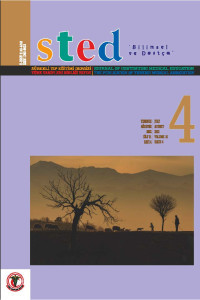Tülin ÇOBAN, Tülay BAĞCI BOSİ, Cemalettin Eren AKINCI, Nazlı ALAOĞLU, Şeyma Nazlı AVCI, Ezgi ERTURUL, Enea FOTİ, Ahmad HAROON, İlayda İŞ, İbrahim Emre KILIÇ
TIP FAKÜLTESİ 6. SINIF ÖĞRENCİLERİNİN (INTERNLER) SU TÜKETİM ve DEFEKASYON ALIŞKANLIKLARININ İNCELENMESİ
GİRİŞ: Kabızlığın önlenmesinde sıklıkla tavsiye edilmesine rağmen sıvı alımının artırılmasını destekleyen çelişkili bulgular bulunmaktadır Bu çalışmada tıp fakültesi son sınıf öğrencilerinin defekasyon alışkanlıkları ve su tüketimleri arasındaki ilişkiyi değerlendirmek amaçlanmıştır. GEREÇ ve YÖNTEM: Çalışma; tanımlayıcı tipte bir araştırma olup veriler web tabanlı anket ile toplanmıştır. SPSS programı kullanılarak sürekli değişkenler için dağılım ölçütleri, kategorik değişkenler için ki-kare testi ile istatistiksel analizler yapılmıştır. BULGULAR: Katılımcıların %50,5’i kadın, yaş ortalamaları 23,4 yıldır. Katılımcıların %55,4’ü su tüketimlerine dikkat ettiklerini belirtirken %50,2’sinin günde 2 litreden daha fazla su tükettikleri saptanmıştır. Roma kriterlerine göre değerlendirildiğinde katılımcıların %31,1’inin kronik kabız olduğu saptanmıştır. SONUÇ: Kabızlık ve su tüketimi arasındaki ilişkinin istatistiksel olarak anlamlı olmadığı saptanmıştır. Ancak katılımcıların %49,8’inin günde 2 litreden az su tüketmeleri önemli bir bulgudur. Bu nedenle öğrencilerin bulundukları alanlarda su tüketimini artıracak eğitim ve düzenlemeler yapılmalıdır.
Anahtar Kelimeler:
su tüketimi, konstipasyon, su alımı, tıp öğrencileri
EVALUATION OF WATER CONSUMPTION AND DEFECATION HABITS oF 6th CLASS STUDENTS oF A MEDICINE FACULTY (INTERNS)
INTRODUCTION: There is contradictory findings that support the increase of fluid intake, although it is often recommended for the prevention of constipation. It is aimed to evaluate the relationship between defecation habits and water consumption of interns of a medicine faculty in this study.MATERIAL and METHOD: The descriptive study was carried out with a web-based questionnaire. Statistical analyzes were made with distribution measure for continuous variables and chi-square test for categorical variables with SPSS program.RESULTS: 50.5% of the participants were women and their average age was 23.4 years. 55.4% of the participants paid attention to water consumption and 50.2% of them were determined to consume more than two liters of water per day. According to the Roman criteria, 31.1% of the participants were found to be constipated. CONCLUSION: It was found that there is no relationship between constipation and water consumption. However, consuming of 49.8% of the participants less than 2 liters of water per day is an important finding. Therefore training and arrangements should be made to increase water consumption of the students in the faculty and hospital.
Keywords:
water consumption, constipation, water intake, medical students,
___
- 1. TC Sağlık Bakanlığı, Türkiye Halk sağlığı Kurumu. Türkiye Beslenme Rehberi 2015. 2016, ANKARA Erişim:https://hsgm.saglik.gov.tr/depo/birimler/saglikli-beslenme-hareketli-hayat db/Yayinlar/rehberler/2015-beslenme-rehberi.pdf (Erişim Tarihi: 11.02.19)
- 2. Türkay C, Aydoğan T, Özden A. Konstipasyon tanım ve epidemiyolojisi. Güncel Gastroenteroloji 2005;9(1):48-52.
- 3. Gray JR. What is chronic constipation? definition and diagnosis. Can J Gastroenterol. 2011;25:7-10.
- 4. Longstreth GF, Thompson WG, Chey WD, Houghton LA, Mearin F, Spiller RC. Functional bowel disorders. Gastroenterology 2006;130(5):1480-1491.
- 5. Akaslan A. Fonksiyonel gastrointestinal hastalıklar tanısında kullanılan roma ııı kriterlerinin türkçeye uyarlanması ve geçerlik güvenilirliği [Uzmalık Tezi]. Ege Üniversitesi Tıp Fakültesi, Çocuk Sağlığı ve Hastalıkları Anabilim Dalı, İzmir; 2011
- 6. Roque MV, Bouras EP. Epidemiology and management of chronic constipation in elderly patients. Clinical İnterventions in Aging 2015;10:19.
- 7. Kasap E, Bor S. Fonksiyonel barsak hastalığı prevalansı. Güncel Gastroenteroloji 2006;10:165-8.
- 8. Jamshed N. Lee ZE. Olden KW. Diagnostic approach to chronic constipation in adults. Am Fam Physician. 2011;84(3):299.
- 9. Mugie SM, Benninga MA, Di Lorenzo C. Epidemiology of constipation in children and adults: a systematic review. Best Pract Res Clin Gastroenterol. 2011;25:3-18.
- 10. Leiper JB . Intestinal water absorption –implications for the formulation of rehydration solutions. Int J Sports Med. 1998;19(2):129-132.
- 11. Fritz D, Pitlick M. Evidence about the prevention and management of constipation: ımplications for comfort Part 1. Home Healthcare Nurse 2012;30(9):533-40
- 12. Boilesen SN, Tahan S, Dias FC, Melli LCFL, de Morais MB. Water and fluid intake in the prevention and treatment of functional constipation in children and adolescents: ıs there evidence?. Jornal De Pediatria 2017;93(4):320-327.
- 13. İnce M, Remzi FH. Kronik kabızlık ve diyet. TAF Preventive Medicine Bulletin 2011;10(1):71-76.
- 14. Türkay Ö, Saka M. Konstipasyon ve diyet. Güncel Gastroenteroloji 2016;20(3):234-239.
- 15. Lee WT, Ip KS, Chan JS, Lui NM, Young BW. Increased prevalence of constipation in pre-school children is attributable to under-consumption of a plant food: a community-based study. J Paediatr Child Health. 2008;44:170-175
- 16. Chan MF, Chan YL. Investigating factors associated with functional constipation of primary school children in Hong Kong. J Clin Nurs. 2010;19:3390-3400
- 17. Park M, Bang YG, Cho KY. Risk factors for functional constipation in young children attending daycare centers. J Korean Med Sci. 2016;31:1262-1265
- 18. Kuhl ES, Felt BT, Patton SR. Brief report: adherence to fluid recommendation in children in receiving treatment for retentive encopresis. J Pediatr Psychol. 2009;34:1165-116919. Young RJ, Beerman LE, Vanderhoof JA. Increasing oral fluids in chronic constipaiton in children. Gastroenterl Nurs. 1998;21:156-161
- 20. Anti M, Lamazza A, Pignataro G, Pretaroli AR, Armuzzi A, Pace V et al. Water supplementation enhances the effect of high-fiber diet on stool frequency and laxative consumption in adult patients with functional constipation. Hepatogastroenterology 1998;45:727-32
- 21. Chien LY, Liou YM, Chang P. Low defaecation frequency in Taiwanese adolescents: association with dietary intake, physical activity and sedentary behavior. J Paediatr Child Health. 2011;47:381-385
- 22. Panda H, Andrews CN. Constipation in a 40-year-old woman. CMAJ. 2016;(4):277-8.
- 23. Jung HK, Kim DY, Moon IH. Effects of gender and menstrual cycle on colonic transit time in healthy subjects. Korean J Intern Med. 2003;18(3):181.
- 24. Devararayana NMi Rajindrajith S. Association between constipation and stressful life events in a cohort of Sri Lankan children and adolescents. J Trop Pediatr. 2009;56(3):144-8
- ISSN: 1300-0853
- Yayın Aralığı: Yılda 6 Sayı
- Başlangıç: 2015
- Yayıncı: Türkiye Tabipleri Birliği
Sayıdaki Diğer Makaleler
Serap KATI, Vahide Aslihan DURAK, Şule AKKÖSE AYDIN
SAĞLIK RİSKLERİ AÇISINDAN SU DAĞITIMI VE SU DEPOLARI
Tülin ÇOBAN, Tülay BAĞCI BOSİ, Cemalettin Eren AKINCI, Nazlı ALAOĞLU, Şeyma Nazlı AVCI, Ezgi ERTURUL, Enea FOTİ, Ahmad HAROON, İlayda İŞ, İbrahim Emre KILIÇ
OBEZ HASTALARDA ANTİMİKROBİYAL İLAÇ DOZLARI
Melda BAHAP, Pınar BAKIR EKİNCİ, Aygin BAYRAKTAR EKİNCİOĞLU, Kutay DEMİRKAN
